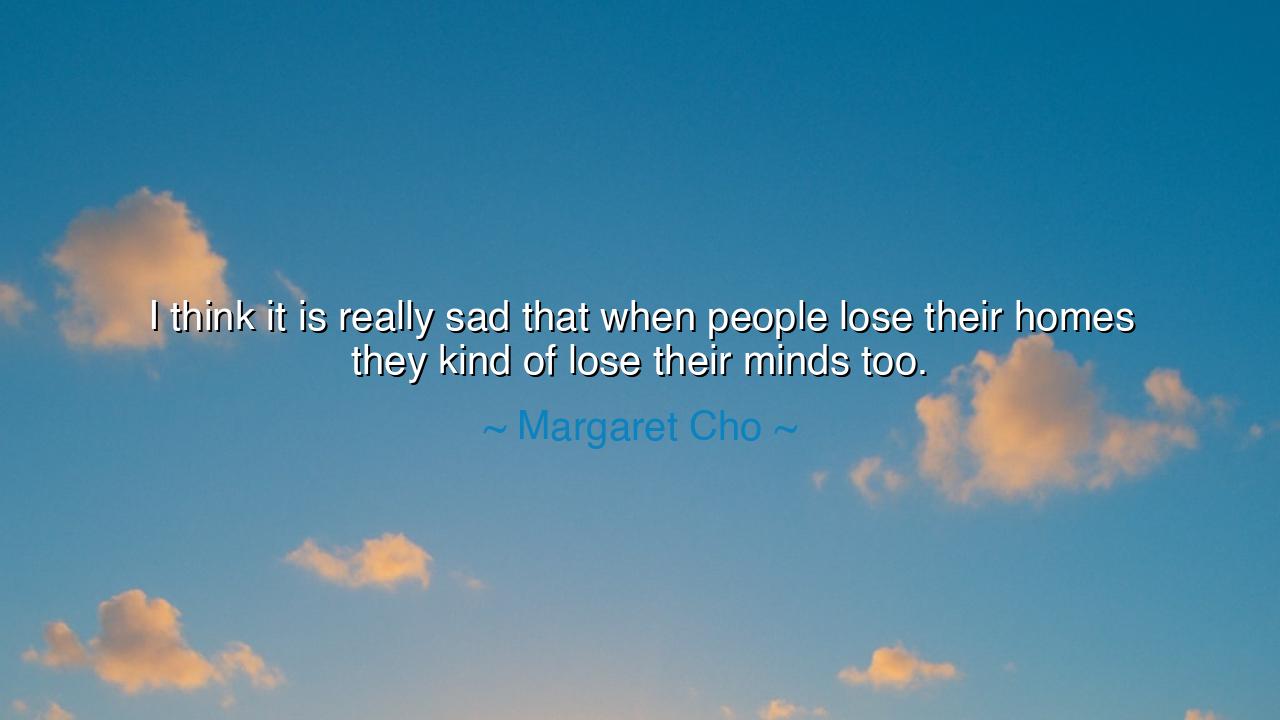
I think it is really sad that when people lose their homes they
I think it is really sad that when people lose their homes they kind of lose their minds too.






Margaret Cho once spoke with quiet sorrow and sharp understanding when she said: “I think it is really sad that when people lose their homes they kind of lose their minds too.” Her words, though simple in form, carry an ancient weight. For they touch upon one of the most sacred truths of human existence—that the home is not merely a shelter of wood and stone, but the vessel of memory, identity, and peace. To lose it is to lose not only comfort but grounding—to become adrift, like a ship without anchor in a storm-tossed sea.
In every age, the wise have known that the mind and the home are bound together. The hearth is not only where warmth is made; it is where the soul learns stability. When one walks through familiar doors, sees the same light fall upon the same walls, hears the voices that give meaning to belonging—there the spirit finds rest. But when that place is taken—by disaster, poverty, or war—the self trembles. Cho’s sadness reflects a truth as old as humanity itself: when the body loses its dwelling, the soul loses its rhythm. The world becomes a blur, and reason, once steady, begins to waver.
The ancients told stories of exile not only as a physical journey but as a spiritual wound. When Odysseus was cast from his home in Ithaca, he did not merely wander across seas—he wandered through his own despair. His long voyage was not just a struggle to return to land, but to return to himself. For the home is the mirror of the heart; it gives shape to the invisible. To be without it is to be caught between past and future, unable to remember who you were or imagine who you might become. Thus, Cho’s observation is not only about homelessness in the material sense, but about dislocation of the mind and spirit.
There is a profound compassion in her words, too. For she sees that society often mistakes the brokenness of the homeless for madness, without understanding its cause. To lose everything that gives life structure—shelter, safety, belonging—is to be forced into chaos. The madness she speaks of is not inherent but born of grief. When a person’s external order collapses, their internal order follows. To watch one’s world dissolve and still be expected to stand tall is more than the human heart can bear. The sadness, then, is not only in the loss itself, but in the world’s blindness to the depth of that loss.
History gives many mirrors to this truth. After the Great Depression, millions of families across America were uprooted, carrying their lives in wagons and walking into the unknown. Diaries from that era tell of people who once laughed and worked, now silent and hollow-eyed, not because they lacked food alone, but because they had lost the place that made life meaningful. And yet, among them, those who rebuilt found that home could be rekindled not only in walls but in community—in kindness, in shared effort, in the will to begin again. Cho’s grief, then, carries a whisper of hope: that even in the ashes of loss, the human spirit may find a way to rebuild its dwelling.
Her reflection is also a warning to the comfortable: that security is sacred, and not to be taken for granted. A society that allows its people to lose both home and mind has lost its heart. The wise must therefore act—not with pity, but with solidarity. For to help another keep or regain their home is to guard the foundation of humanity itself. When we protect the dwellings of others, we protect the sanity of the world.
So let this teaching be passed on: to have a home is to have a sanctuary for the mind. Guard it, cherish it, and never turn your face away from those who have lost theirs. If you meet one who has fallen into homelessness, do not look upon them with judgment but with reverence—for they carry the weight of exile, one of life’s deepest sufferings. And if your own walls stand strong, let them not be prisons of comfort, but beacons of compassion. For as Margaret Cho reminds us, when the home is lost, the heart falters—and when the heart is cared for, even the lost can find their way home again.






AAdministratorAdministrator
Welcome, honored guests. Please leave a comment, we will respond soon